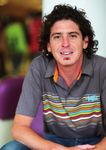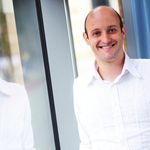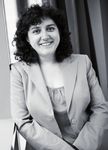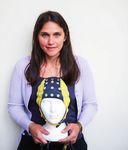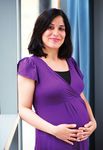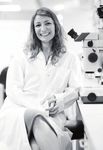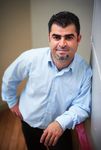Aksam Merched - Europa EU
←
→
Page content transcription
If your browser does not render page correctly, please read the page content below
Aksam
Merched
‘My Marie Curie fellowship helped me
acquire technical skills for my projects
and obtain the required accreditation for
professorship in France. It is a rewarding
process which has strengthened my career
with a strong international networking,
exposure and skills development.’
Born in Lebanon, Aksam is a French-American
researcher, who benefitted from a Marie Curie
grant to return to Europe and continue his research
on atherosclerosis, a progressive condition involv-
ing a hardening of the arteries which often leads
to heart disease. High cholesterol and ageing are
two of the main causes of atherosclerosis, but
thanks to Aksam, Marie Curie Actions and a healthy
diet, European citizens could have a treatment
available sooner than expected.
ec.europa.eu/research/mariecurieactions
Marie Curie ActionsArmando
Arias Esteban
‘The huge prestige of Marie Curie Actions
across Europe and excellent economic
conditions motivated my application.
They facilitated my mobility from
Madrid to London and gave me the
opportunity to establish a large network
of international collaborations which
may definitely enhance my professional
aspirations.’
With the recent influenza pandemic in Western
Europe, it is essential for health care services to be
able to cope with seasonal peaks of several types
of viruses. With the help of the Marie Curie Actions,
Armando is doing innovative research on a probi-
otic approach towards control of large scale path-
ogens. Probiotics are live micro-organisms thought
to be beneficial to host organisms. They are used
in prevention to strengthen the immune system.
ec.europa.eu/research/mariecurieactions
Marie Curie ActionsClaire
Chaussade
‘I had a short break in my career to give
birth to my son and this prestigious fel-
lowship greatly facilitated resuming my
research career and achieving an appro-
priate work/life balance.’
Claire works on signalling pathways implicated
in cancer, inflammation and diabetes, but right
after her son was born, she was above all very
happy to be a Marie Curie Actions fellow: on top of
very attractive salaries for researchers, the pro-
gramme makes it easier to resume a career after
any type of break. Cancer and diabetes are the
first two causes of mortality in Europe, so it is
essential to keep the brightest researchers on the
case. This is one of the objectives of the Marie
Curie Actions.
ec.europa.eu/research/mariecurieactions
Marie Curie ActionsCaterina
Minelli
‘During my Marie Curie fellowship
I learnt how new technologies can impact
upon our everyday life through innova-
tion, for example in the treatment and
cure of cancer. And the grant also helped
me discover new reasons to enjoy science!’
Caterina’s research project is about cancer treat-
ment. Her multidisciplinary project proposes
a novel drug delivery approach based on highly
engineered nano-materials. Thanks to Marie Curie
Actions, Caterina has received multidisciplinary
scientific training combining medical research with
innovation technologies and thereby an excep-
tional opportunity to attain professional maturity.
ec.europa.eu/research/mariecurieactions
Marie Curie ActionsClaire
Sergent
‘My Marie Curie Actions Reintegration
Grant covers my research costs and it
allows me to develop personal projects
while integrating in a research team
already in place. The grant also made it
possible for me to carry out my research
in excellent working conditions.’
Claire is a brain specialist and she wondered: ‘Does
our conscious perception of an external object
arise gradually or in a discontinuous fashion?’
Marie Curie Actions cover all topics of research,
thus appealing to researchers in all fields. And with
more than 60 000 fellows funded since 1996, the
chances are that you have already been in contact
with the programme one way or the other.
Gradually or in a discontinuous fashion.
ec.europa.eu/research/mariecurieactions
Marie Curie ActionsClaudia
Almeida Gomes
‘At the end of my PhD it was clear to
me that it was essential to make my CV
more competitive to find an independ-
ent research position in the future.
I applied for a MCA long-term fellow-
ship to complement an EMBO fellow-
ship, which allowed me publish in a high
impact journal.’
Claudia is trying to elucidate molecular mecha-
nisms on sorting events occurring in endosomal
membranes, inside eukaryotic mammalian cells.
Try not to worry too much if you do not understand
the previous sentence: Marie Curie Actions are
making sure that we leave the work to brilliant
researchers like Claudia.
ec.europa.eu/research/mariecurieactions
Marie Curie ActionsDaniela
Cota
‘The Marie Curie International
Reintegration Grant represents a pres-
tigious type of funding and it undoubt-
edly helped in further supporting the
evolution of my career from post-doc-
toral scientist to independent principal
investigator and research team leader.’
Daniela works on the mechanisms leading to
the development of obesity, one of the greatest
public health challenges of the 21st century in
Europe. Thanks to her Marie Curie fellowship, she
was able to set up her own laboratory and also
developed management skills as she is currently
leading eleven talented people. Daniela is partic-
ularly keen on bringing her expertise to private
partners and her ideas closer to the market.
ec.europa.eu/research/mariecurieactions
Marie Curie ActionsDessislava
Nikolova
‘After obtaining a PhD in computer
science and having worked in the telecom-
munication industry, the Marie Curie
Actions Intra-European Fellowship gave
me the opportunity to gain a truly inter-
disciplinary, pure research experience in
theoretical nanoscience.’
Europe gave birth to the GSM communication
networks standard back in the 1980s. Today,
information and communication technology is
growing fast and the experimental research of
women like Dessislava is essential if Europe wants
to come up with ground-breaking solutions, like
nanonetworks and nanocommunication.
ec.europa.eu/research/mariecurieactions
Marie Curie ActionsElke
Binder
‘The prestigious Marie Curie grant
allows me to learn new techniques and
will add valuable publications to my
CV. I am confident that my improved
professional profile will open new
opportunities in the competitive scien-
tific job market.’
Elke tries to understand the underlying molecular
mechanisms that induce hunger and ‘full-ness’
with a view to preventing and treating obesity,
a condition that has now reached the status of an
epidemic in Europe and beyond. Also, Elke’s
research will investigate ways to facilitate body
weight loss.
ec.europa.eu/research/mariecurieactions
Marie Curie ActionsEsmeralda
Valiente
‘The Marie Curie Actions fellowship
provided me with a unique opportunity
to develop my skills as a molecular micro-
biologist, especially due to the applica-
tion of modern genetic approaches.’
Esmeralda is doing research at the forefront of
microbial genetics. She studies the emergence
of hyper-virulent strains of bacteria at the origin
of outbreaks of diarrhoea in hospitals worldwide.
This common complication of hospitalisation
claims thousands of victims every year. Marie
Curie Actions fund all types of research topics, from
genetics to human science. Because investing in
research is investing in our future.
ec.europa.eu/research/mariecurieactions
Marie Curie ActionsEszter
Vamos
‘The Marie Curie Actions grant played
a crucial part in achieving my long term
goals of a career in academic public
health and contribution to the growing
field of chronic disease management.’
Eszter works on diabetes. Patients with diabetes
are subject to vascular events and other adverse
outcomes. The ultimate objective of her research
is to translate knowledge gained from epidemio-
logical studies into preventive action and evaluate
different preventive approaches in chronic disease
management.
ec.europa.eu/research/mariecurieactions
Marie Curie ActionsFederico
Davila
‘I applied for a Marie Curie Actions fel-
lowship because of the enormous prestige
of being a Marie Curie fellow. Today,
this grant has already taught me many
things, not only related with science,
but also with people and culture.’
Federico is an Argentinean geologist and has
spent two years in Europe followed by one year
in his home country, carrying out a project which
combined numerical and geophysical approaches.
In today’s world, research needs to be done
across borders and sectors. The presence of
Federico in Europe will help strengthen these es-
sential links.
ec.europa.eu/research/mariecurieactions
Marie Curie ActionsFelix
Rico
‘During my Marie Curie grant,
I learnt new techniques and methods,
I got involved in interesting side projects
establishing new collaborators, and
importantly I increased my publication
record. Moreover, all the process of
application, management and reporting
allowed me to learn a bit more about
research funding and the process of
grant developing and writing.’
The Marie Curie Actions not only broaden career
perspectives, they also equip researchers with
other skills such as writing applications, patenting
and marketing products and services. These are
not always covered during doctoral training, but
they are essential in an economy where new ideas
need to be as close to the market as possible.
ec.europa.eu/research/mariecurieactions
Marie Curie ActionsFernanda
Bajanca
‘This project provided me with the right
conditions to perform first class research
in an extremely stimulating project and
environment. Never before did I have
the opportunity to work in an institute
with such strong expertise in my areas
of interest.’
Fernanda is doing research on Duchenne Muscular
Dystrophy (DMD), a degenerative genetic disease
that damages muscles. DMD patients seldom sur-
vive past the age of forty. The project of Fernanda
proposes to set up a multidisciplinary international
team to study gene therapy. Because looking
across sectors and borders is usually a good way
to move forward.
ec.europa.eu/research/mariecurieactions
Marie Curie ActionsFrancesco
Belardinelli
‘The Marie Curie fellowship helped me
acquire a position of professional matu-
rity in my research area. So I see it as
a fundamental step in the progression
of my academic career.’
Francesco works on the logic-based languages
used to describe multi-agent systems. Even if this
sounds very complicated, this field of research has
applications in web services, robotics, avionics and
economics. This is what innovation is about: bring-
ing great complex ideas to the general public.
Exactly what Marie Curie Actions are about.
ec.europa.eu/research/mariecurieactions
Marie Curie ActionsIgnacio
Gallo
‘My Marie Curie fellowship has so
far allowed me to choose a research
topic to which I had had no previous
exposure, but which I was fully scien-
tifically ready to tackle, and to start
making my own way towards produc-
ing original results.’
In his research, Ignacio revisits Darwin’s theory of
evolution, mixing mathematics, statistical physics
and biology to gain a better understanding of all
the elements at play in evolution. This innovative
approach represents a paradigm shift in the field
and will most certainly help designing the ecologi-
cal solutions of tomorrow.
ec.europa.eu/research/mariecurieactions
Marie Curie ActionsIsabel
Krug
‘Thanks to the wide range of resources
available – both from the Marie Curie
fellowship and the institution – and the
breadth of interests represented by my
supervisors, I knew I would be guided
into a successful career as independent
investigator.’
Isabel is carrying out a research project in the
field of eating disorders. She uses an integrated
and multidisciplinary approach to study genetic,
behavioural and cultural aspects of this increas-
ing societal problem. This innovative and excel-
lent approach means that she will emerge with
a deep understanding of eating disorders as well
as new skills.
ec.europa.eu/research/mariecurieactions
Marie Curie ActionsJanos
Kriston Vizi
‘The Marie Curie Actions fellowship
does not only help me to define myself
as a distinguished specialist, it will also
enable me to establish my own research
group in the near future and develop
excellent cooperation with world-
leading research institutions.’
Janos’ career in research began in Budapest, and
then continued in Japan and in Singapore. The
Marie Curie Actions helped him come back to
Europe, where he now spends time understanding
the factors underlying public perceptions of sensi-
tive technologies – technologies whose implica-
tions intersect with social values and challenge
presumptions about the natural order and life.
ec.europa.eu/research/mariecurieactions
Marie Curie ActionsJeremy
Sejberg
‘Upon completion of my PhD in
Denmark, I wanted to further build
on my knowledge and experience in
synthetic organic chemistry. The Marie
Curie fellowship gave me the chance to
work on an exciting research project
with potential applications in the treat-
ment of allergic disorders. As an added
bonus, this would also bring me closer to
my girlfriend who lives in London.’
Because doing excellent research means living
in an excellent environment, Marie Curie Actions
allow their fellows to integrate their private and
professional lives. This is fitting for Jimmy, who
works on a new series of small drug-like mole-
cules based on natural products for potential
anti-asthma/allergy therapeutic applications.
Improving the life of allergy sufferers.
ec.europa.eu/research/mariecurieactions
Marie Curie ActionsJohn
Armitage
‘The Marie Curie fellowship gave me
a real chance to learn new scientific
techniques, in my case, running fluid
dynamic experiments. The benefits
of the grant are simply that I am now
working in a new country with new peo-
ple and new challenges.’
John is working on the formation of cratonic
basins and how it relates directly to the wider
question of long-term stability of continental plat-
forms. Marie Curie Actions fund all topics of
research, from economics to mathematics and
plate tectonics. This approach means that all fields
are covered by the most innovative and excellent
brains in Europe and beyond.
ec.europa.eu/research/mariecurieactions
Marie Curie ActionsJohn
Greenwood
‘Applying for my own research funding
was an important step for my research
career. Having completed one post-
doctoral position already, I needed to
be able to demonstrate my potential to
attract research funding. The Marie
Curie fellowship was an excellent oppor-
tunity to do this and they substantially
increased the likelihood of both future
funding and a permanent research
position down the line.’
John works on visual crowding, the disruptive
effect of ‘clutter’ on our ability to recognise objects,
despite their being identifiable in isolation (the
more you see, the less you see). He uses psycho-
physical experiments and computational mod-
elling to explore new aspects of visual crowding.
His work will help design effective artificial vision.
And spot Wally.
ec.europa.eu/research/mariecurieactions
Marie Curie ActionsKarin
Edvardsson Björnberg
‘The Marie Curie Actions grant helped
me enter more deeply into the philoso-
phical research areas that I have special-
ized in and gave me the opportunity to
form new research collaborations.’
Marie Curie Actions fund all fields of research,
including social sciences, allowing them to tackle
all the grand challenges of tomorrow, as identi-
fied in the Europe 2020 strategy. Among them
is climate change. Karin is actually working on
the philosophical approach to climate change.
What solutions does our society need to find?
How can we implement them in an ever-chang-
ing environment?
ec.europa.eu/research/mariecurieactions
Marie Curie ActionsKeira
Melican
‘The Marie Curie Actions Intra-
European Fellowship was on top of my
priority list of fellowships due to its
prestige, attractive mobility allowances
as well as the networking and support
benefits it proposes.’
Keira’s research will further our understanding
of a bacterium that can cause meningitis (a bac-
terial infection of the brain). The Marie Curie
Actions finance hundreds of projects on public
health issues. The prestige of Marie Curie fel-
lowships and the autonomy given to research-
ers both underpin their success. The grants cover
conference costs and their travel expenses, ena-
bling fellows to attend key conferences and
interact with their peers.
ec.europa.eu/research/mariecurieactions
Marie Curie ActionsLaurent
Ponson
‘I applied for a Marie Curie fellowship
a few months after I defended my thesis.
I was working on fundamental aspects
of the physics of materials, investigating
how materials break, from the atomic
to the macroscopic scale. This study
inspired me many ideas on how to design
stronger materials.’
Today, Laurent works at the California Institute of
Technology, an exceptional scientific environment
where he was offered the material and intellectual
means to develop his project successfully, among
the founding fathers of Fracture Mechanics. Marie
Curie Actions allow the best researchers to carry
out projects in the most prestigious research insti-
tutions. Just like Laurent at CalTech.
ec.europa.eu/research/mariecurieactions
Marie Curie ActionsLionel
Poulin
‘Now, it is my turn to attract in my new
group a highly qualified researcher, also
eligible for a Marie Curie fellowship.
I’m looking forward to taking my next
step as a group leader and I really want
to thank Marie Curie Actions for this.’
After a first post-doctoral fellowship in France,
Lionel decided to pursue his training in a specific
laboratory in London leading in cancer immuno-
therapies. Thanks to the Marie Curie grant abroad,
he now holds a position of research group leader
in his home country. Further practical proof that
mobility works in research. Just like with Marie
Curie Actions.
ec.europa.eu/research/mariecurieactions
Marie Curie ActionsLisa
Wingate
‘The Marie Curie Actions fellowship
gave me the scientific and financial
independence to achieve this project
and provided me with enough resources
and flexibility to convince me that the
move could work not only for my career,
but also for my family.’
Climate change is a concern for many European
citizens. Lisa is working hard to gain a better
understanding of various aspects of the prob-
lem, notably on underground storage of carbon
and CO2 gas. Thanks to the Marie Curie Actions
she was able to move with her family from one
country to the other. Moreover, the fellowship
helped Lisa get a permanent position in her host
institution. Marie Curie Actions promote excellent
employment conditions for researchers with
permanent contracts.
ec.europa.eu/research/mariecurieactions
Marie Curie ActionsLuca
Acquarelli
‘The Marie Curie fellowship is an impor-
tant opportunity to develop my research
on visual studies and on semiotic-social
meanings of images: modernity and
advertising poster in Paris at the begin-
ning of 20th century.’
Marie Curie Actions cover all topics of research like,
in the case of Luca, important aspects of European
identity through the study of posters in Paris as
‘social events’. He uses these images as a source
of documentation of social practices. These defined
the future evolution of advertising, with influences
still visible today. It was as innovative back then as
Luca is today.
ec.europa.eu/research/mariecurieactions
Marie Curie ActionsMaria
Jover-Cobos
‘When I read that my Marie Curie pro-
ject was accepted, I felt like opening the
window of my room and enjoying that
fantastic spring day. The first thing I did
was to call my mother and my family to
tell them the great news.’
Maria works on gene therapy to treat cases of liver
failure. She was originally denied the opportunity
to carry on her research on the topic, but the Marie
Curie grant made it possible for her to obtain fund-
ing in an elite institution. The project impacted
directly upon a number of inter-related disciplines
which provided her with the opportunity to develop
skills in relation to research management, presen-
tation, and questions on ethics.
ec.europa.eu/research/mariecurieactions
Marie Curie ActionsMarkus
Butz
‘Thanks to the Marie Curie Actions,
working under a “standard contract”
including all social insurances gives me
the security I need to concentrate on my
research and even allowed me to bring
my family to such a fascinating place like
the British capital. This would not have
been possible with other less generous
funding schemes.’
Markus works on neurological conditions such as
Parkinson’s disease and Focal Hand Dystonia.
Parkinson’s disease alone affect 2 % of the 50 year
old and plus population. To gain a better under-
standing of the complex phenomena at play in
these diseases, he needs access to facilities, fund-
ing and his loved ones. Marie Curie Actions allowed
him to have exactly that.
ec.europa.eu/research/mariecurieactions
Marie Curie ActionsOttavio
Quirico
‘The Marie Curie fellowship is very
attractive because it is based on merit
and genuinely promotes excellence,
which grants researchers with a promi-
nent status at the European and inter-
national level. Also, it provides the
necessary conditions to develop an in-
depth research. Third, the basic concept
of mobility pushes the researcher to
broaden his intellectual horizon and to
acquire a truly European and interna-
tional mindset.’
Ottavio works on the legal issues regarding pri-
vate security companies, which sell security ser-
vices like armed guards, criminal investigation
or alarm systems. Over the past decade, the
activity of these companies has been constantly
increasing, notably during the Iraq and Afghani-
stan conflicts. His research studies the regula-
tory network currently in place for private security
companies, examining possible reforms.
ec.europa.eu/research/mariecurieactions
Marie Curie ActionsOlga
Martins de Brito
‘I decided to apply for a Marie Curie
fellowship because they are very prestig-
ious and I knew they would give me the
possibility to carry on my own research
project independently. Also, it improved
considerably my quality of life as it pays
very well which is particularly impor-
tant in a city like London.’
Olga is doing research on cellular pathways
which will most probably be linked to neurode-
generative diseases and cancer. Thanks to the
European grant, she was able to carry out her
work in London. This move would have been
very hard without Marie Curie Actions, which
focus on mobility and training of the most excel-
lent researchers in the world.
ec.europa.eu/research/mariecurieactions
Marie Curie ActionsPilar
Bustos
‘The Marie Curie fellowship helped
me improve my scientific skills and
reach professional maturity. It allowed
me to make decisions concerning the
experimental approaches but also the
project administration. The grant also
gave me the opportunity to discover
different ways to lead a scientific
group and establish collaborations
for my next professional projects.’
Pilar will surely benefit from the European support
from a professional point of view, but the mobil-
ity dimension of the programme will also allow
her to improve her knowledge of a foreign lan-
guage and to meet new people with different cul-
tures, customs and way of thinking. Her study on
epigenetic mechanisms of plants could have some
applications for agriculture with higher crop pro-
ductivity by improving plant resistance to drought
or salt for instance.
ec.europa.eu/research/mariecurieactions
Marie Curie ActionsRaelize
du Plooy
‘When I applied to a Marie Curie
programme, I did not have the faintest
idea of the fantastic experience I would
have for the next three years! I have
always been interested in research and
being from South Africa, the opportu-
nity to come to Europe – to a whole dif-
ferent world in terms of science and
research – was a dream come true.’
Raelize is part of a research training project
combining institutions from Europe and beyond.
It focuses on developing the transport infrastruc-
tures of tomorrow, to meet the targets for European
competitiveness and to design processes that will
deliver cheap and sustainable transport. Marie
Curie Actions are at the core of training the next
generation of PhD candidates.
ec.europa.eu/research/mariecurieactions
Marie Curie ActionsRomain
Koszul
‘After more than three years working
as a post-doctoral fellow at Harvard
University, I started looking for opportu-
nities to relocate to Europe in the best
conditions possible. I realized that
a Marie Curie grant would provide my
projects with substantial momentum
given the large flexibility the funding
allows in using the money.’
Romain is a great example of what Europe needs
in terms of research. He did a post-doctoral fellow-
ship in Harvard and applied for a Marie Curie rein-
tegration grant after he decided to relocate to
France. There, he developed collaborations with
other European labs before obtaining a permanent
position in CNRS. He then received a grant from the
European Research Council, but that is the next part
of his story.
ec.europa.eu/research/mariecurieactions
Marie Curie ActionsSalvatore
Tringali
‘I am living a dream that comes true
again every single day. The Marie Curie
fellowship has put me in a stimulating
environment with outstanding
researchers, which is most likely to facili-
tate my scientific production. Thus I can
extend the record of my papers by a con-
siderable amount, both in qualitative
and in quantitative terms, and achieve
standards of definite excellence.’
Salvo works on mathematical models for techno-
logical devices such as satellites, antennas and
medical imaging setups. Marie Curie allowed this
highly-skilled researcher to work in the best envi-
ronment possible, take on new challenges and
cross unexplored frontiers. To remain competitive,
Europe needs to invest 3 % of its wealth in research.
And in excellent researchers like Salvo.
ec.europa.eu/research/mariecurieactions
Marie Curie ActionsSarah
Léonard
‘I decided to apply for a Marie Curie
fellowship mainly because I wanted to
experience a different research environ-
ment and extend my research network.
I think it is really important for research-
ers to have experience at various institu-
tions and in different countries, as each
of them has a different research culture.’
Sarah’s quote means a lot, since she works on the
European Union’s asylum and migration policy,
within the European agencies in charge of these
topics. Marie Curie Actions fund any domain of
research, including social sciences. Thanks to tal-
ented people like Sarah, Europe will benefit from
a set of relevant findings in policy-making fields.
ec.europa.eu/research/mariecurieactions
Marie Curie ActionsTiago
Brandao Rodrigues
‘When I started to prepare my Marie
Curie fellowship application, I felt it
could represent a unique opportunity,
not only for the development of my scien-
tific career but also for my life in general.
It allowed me to choose my ideal research
group, explore my own ideas and acquire
and develop the skills and tools for my
career as an independent scientist.’
Tiago is doing research on patient response to can-
cer treatment. Europe has decided to put health
and well-being at the centre of its political agenda
for the years to come. Marie Curie Actions is one
of the tools to work on the problem, relying on
excellent researchers like Tiago.
ec.europa.eu/research/mariecurieactions
Marie Curie ActionsVanessa
Sancho-Shimizu
‘My time as a Marie Curie fellow has
been a highlight of my post-doctoral
experience. The fellowship has lived up
to its reputation and my greatest expecta-
tions. My time as a post-doctoral fellow
has enabled me to acquire additional
expertise in areas which will be critical
to my future research endeavours.’
Vanessa is the perfect example of a Marie Curie
fellow. Working on health issues, she managed to
obtain two Marie Curie grants; one to carry out her
research abroad and one to establish herself later
in her career. Her excellence has taken her across
continents, from France to the USA and back, with
stops in Canada and Japan, the country where she
was born. Today, she is thinking about involving
international industry partners in her work.
ec.europa.eu/research/mariecurieactions
Marie Curie ActionsVéronique
Van Elewyck
‘After a two-year post-doctoral training
period in Mexico, the Marie Curie fellow-
ship represented the best option to reinte-
grate the European research environment
within optimal working conditions:
a good salary, a renowned host institute
and a significant amount of funding for
travelling, which would allow me to com-
municate on my work and to develop new
collaborations.’
Véronique is a researcher in astrophysics. Her work
will help us better understand the distant Universe.
But before she can do so, she needs to find a place
in a lab, build her own networks and increase her
visibility. This is a small price to pay for such an
ambitious objective. Marie Curie Actions are here
to support bright minds exactly like hers.
ec.europa.eu/research/mariecurieactions
Marie Curie ActionsVincenzo
Giannini
‘Studying physics and work on science is
my biggest childhood dream. The Marie
Curie Actions represent one of the best
opportunities I had to make it come
true. Because it allowed me to choose
the place and the collaborators I prefer.
In other words, this means working
exactly the way I wanted to.’
Vincenzo works on the fairly complicated concept
of quantum physics: metamaterials. These artifi-
cial materials have properties that may not be
found in nature, with potential applications in fields
like cloaking and optical devices. Metamaterials
will hopefully one day have an impact on the eve-
ryday life of European citizens. Marie Curie Actions
let him grapple with his research by giving him the
environment he needs to do so.
ec.europa.eu/research/mariecurieactions
Marie Curie ActionsXavier
Nicol
‘After of my PhD, I wanted to go further
in academic research and go abroad to
improve my foreign language skills and
acquire professional experience there.
In that framework, the Marie Curie
grant gave me the opportunity to develop
my own research project with a large
degree of autonomy.’
Xavier undertakes research on the nervous sys-
tem. He wanted to travel, discover new cultures
and new ways to carry out research. He also
needed independence in his work and to be
released from the burden of looking for funding
while dealing with tight deadlines. Marie Curie
Actions were ideal for him.
ec.europa.eu/research/mariecurieactions
Marie Curie ActionsXu
Dong
‘I am a researcher in computational
fluid dynamics from Tianjin University,
China. As my objective was mainly to
collaborate with Europe’s most out-
standing experts, the prestigious Marie
Curie grant was a precious opportunity
for me. I believe my research experience
through this MCA grant will build
up a solid foundation for my life-long
research career.’
Because the brightest ideas come from mixing
the brightest minds from all over the world, Marie
Curie Actions were glad to bring excellent talents
like Xu Dong to Europe.
ec.europa.eu/research/mariecurieactions
Marie Curie ActionsA Europe 2020 initiative
Dear Visitor,
You are probably familiar with the name of one of the greatest physicians of 20th century: Marie Skłodowska-Curie.
She was the first woman to ever win two Nobel Prizes in two different disciplines: Chemistry and Physics. She is also
famous for having discovered ‘polonium’ and ‘radium’, two radioactive chemical elements. And she was the one who
coined the term ‘radioactive’, which we all know today.
However, did you know that she was also a European pioneer in the field of research mobility as she moved from her
native Poland to study at the Sorbonne University in France? Although it may seem quite common nowadays to move
and work across Europe, and for women to carry out PhDs, it was quite unusual at the time. Marie Curie did not only
contribute to scientific discoveries, she also paved the way for the emancipation of woman in science and research.
To honour her memory, and to perpetuate the values for which she stood, the European Commission created in 1996
a programme funding researchers’ mobility regardless of their age, gender or nationality: the Marie Curie Actions.
The European Commission has a broad understanding of the term ‘mobility’. Mobility means moving from the coun-
try where the researcher is based to another one, including the attraction of foreign and European researchers to (re)
locate to Europe to pursue their career. It is also the mobility during a career, for example moving to work in the private
sector from the academic sector. In order to broaden the career perspectives of researchers, the programme moreover
provides training that is international, interdisciplinary and intersectoral (involving business & academia).
The beneficiaries of the grants of the Marie Curie Actions are called ‘fellows’. Since its creation, the programme has
supported more than 65 000 fellows and this figure is expected to reach 80 000 fellows by 2014. Over the years,
the programme has become more and more successful and is now a prestigious line to put in a researcher’s CV.
The Marie Curie Actions promote gender equality and have an objective whereby the share of participation by women
is 40%. They offer attractive working conditions to researchers by providing them with an employment contract, full
social benefits, parental leaves, and the possibility to resume work after a break! The logic is simple: having better
working conditions and improving the status of researchers will attract people to the profession in Europe.This is why the actions promote the ‘European
ropean Charter for Researchers and the Code of Conduct for the
Recruitment of Researchers’. The Charter
rter provides a framework for the career management of researchers, while
the Code promotes open and transparent recruitment and appraisal pprocedures.
One of the key elements of the Marie Curie programme is the com bot-
competitive salaries offered. Another is the ‘bot-
tom-up’ approach, where there are no predefineded topics of research. Practically, it means that researchers or organ-
atter the discipline. From social sciences to fundamental research, they
isations devise the projects themselves, no matter
are all welcome!
cher mobility? The Union firmly believes that Research and Innovation
Why did the European Union decide to fund researcher
are the backbone of the economy, that they led to most of the discoveries of the last century and the resul
resulting eco-
nomic growth. In a time of crisis, it is more importantnt than ever to support research efforts in Eu
Europe to face inter-
national competition. In addition, the level and qualityy of research is uneven acro
across Europe. By enabling the mobility
of researchers and exchange between institutions and d industry, we contribute to expanding the research landscape
red skills with their colleag
of Europe. Researchers can then share their newly acquired colleagues and the next generation. And
because research and knowledge should not be restricted to the scientific community sol solely, the Marie Curie Actions
strongly encourage their fellows to disseminate their results and to tell the public wh
what they do.
rie fellows. Although thi
In this exhibition, you will see different faces of the Marie Curie this is just a small sample, each
fellow having a different profile and experience, they all agree on one thing: Marie CuCurie Actions changed their
lives and boosted their careers.
becom a Marie
Enjoy this exhibition, you may have a Marie Curie fellow in your entourage or who knows, you may become
Curie fellow one day?
Marie Curie Actions
The Marie Curie team would like to thank Imperial College London and the Conférence des Présidents d’Universités in Paris for their kind collaboration. And special thanks to our
photographer François de Ribaucourt for his talented eye!Une initiative Europe 2020
Chers visiteurs,
Vous connaissez probablement le nom de l’une des plus grandes physiciennes du 20ème siècle: Marie Skłodowska-
Curie. Elle fut la première femme à remporter deux Prix Nobel dans deux disciplines différentes: en chimie et en
physique. Elle est également célèbre pour sa découverte du polonium et du radium, deux éléments chimiques
radioactifs. C’est d’ailleurs elle qui inventa le terme «radioactivité» que nous connaissons tous aujourd’hui.
Mais saviez-vous qu’elle fut aussi une pionnière de la mobilité européenne dans la recherche en quittant sa
Pologne natale pour faire ses études à l’Université de la Sorbonne, en France? Même si cela peut paraître ordinaire
aujourd’hui de se déplacer, de travailler partout en Europe et de voir des femmes obtenir des doctorats, la chose
était fort peu commune pour l’époque. Marie Curie n’a pas seulement contribué à des découvertes scientifiques,
elle a également ouvert la voie à l’émancipation de la femme dans le domaine de la science et de la recherche.
Pour honorer sa mémoire et perpétuer les valeurs qu’elle a défendues, la Commission européenne a mis en place
en 1996 un programme de financement de la mobilité des chercheurs quels que soient leur âge, leur sexe ou leur
nationalité: les actions Marie Curie.
La Commission européenne a une notion très étendue du terme «mobilité». Celle-ci inclut le fait de permettre
à un chercheur de se déplacer vers un autre pays et d’attirer en Europe des chercheurs afin qu’ils s’y (ré)installent
pour y poursuivre leur carrière. Elle inclut également la mobilité au cours de leur carrière, par exemple en quittant
le secteur académique pour aller travailler dans le secteur privé. Afin d’élargir les perspectives de carrière des
chercheurs, le programme propose par ailleurs des formations internationales, interdisciplinaires et intersectorielles
(qui impliquent les secteurs public et privé).
Les bénéficiaires des bourses Marie Curie sont appelés des boursiers. Depuis sa création, le programme a soutenu
plus de 65.000 boursiers et on s’attend à voir ce chiffre grimper à 80.000 à l’horizon 2014. Au fil des années, le
programme a connu un succès grandissant et constitue aujourd’hui un atout prestigieux dans le CV des chercheurs.
Les actions Marie Curie défendent l’égalité des genres et ont pour objectif d’atteindre un taux de participation
des femmes de 40 %. Elles proposent des conditions de travail attrayantes par le biais de contrats de travail, d’une
couverture sociale complète, de congés parentaux et de la possibilité de reprendre le travail après une interruption!
La logique est simple: de meilleures conditions de travail et une amélioration du statut des chercheurs attireront
des gens vers cette profession en Europe.C’est la raison pour laquelle les actions soutiennent
utiennent la «Charte européenne du chercheur et le Code de conduite
pour le recrutement des chercheurs». ». La Charte fournit un cadre pour la gestion de carrière des chercheurs
tandis que le Code défend un système de procédures de recrutement ouvertes et transparentes.
L’un des éléments clés du programme Mariee Curie, ce sont les salaires
sala ent,
compétitifs qu’il propose. Autre élément,
ncer tous les domaines de recherche. En pratique, cela signifie que
l’approche «ascendante», qui permet de financer
nt les projets eux-même
les chercheurs ou les organisations préparent eux-mêmes, quelle que soit la discipline. Des sciences
sociales jusqu’à la recherche fondamentale, tous les domaines sont les bienvenus!
Pourquoi l’Union européenne a-t-elle décidé de financer la mobilité des chercheurs? Parce qu’elle est co convaincue
ilier de l’économie, qu’elles ont permis de faire la plupart
que la recherche et l’innovation constituent le pilier plu des
’essor économique qui a suivi. En temps d
découvertes du siècle dernier qui ont contribué à l’essor de crise, il est plus
rche en Europe pour faire face
important que jamais de soutenir les efforts de recherche f à la concurrence internationale.
De plus, le niveau ainsi que la qualité de la recherche n’est pas égal partout en E
Europe. En encourageant la mobilité
des chercheurs et les échanges entre les institutions et l’industrie, nous contrib
contribuons à l’expansion du paysage de
la recherche en Europe. Les chercheurs peuvent partager er les compétences nouvellement
nouvelle acquises avec leurs
collègues et la nouvelle génération. Et parce que la rechercheherche et la connaissance
connaissanc ne doivent pas être limitées
uniquement à la communauté scientifique, les actions Mariee Curie encouragent leurs boursie
boursiers à disséminer leurs
résultats et expliquer ce qu’ils font au grand public.
siers Marie Cur
Au fil de cette exposition, vous verrez plusieurs visages de boursiers Curie. Même si ce n’est là qu’un petit
érents, ils sont tous d’accord sur
échantillon de gens avec chacun leur expérience et leur profil différents, su un point:
les actions Marie Curie ont changé leur vie et donné un coup de fouet à leur carrière.
Profitez de cette exposition, vous avez peut-être un boursier Marie Curie dans votre entourage ou, qui sait, vous
pourriez bien en devenir un vous-même un jour?
Marie Curie Actions
L’équipe Marie Curie tient à remercier l’Imperial College London ainsi que la Conférence des Présidents d’Universités à Paris pour leur aimable collaboration. Et un merci tout
particulier pour François de Ribaucourt et son regard plein de talent !You can also read

